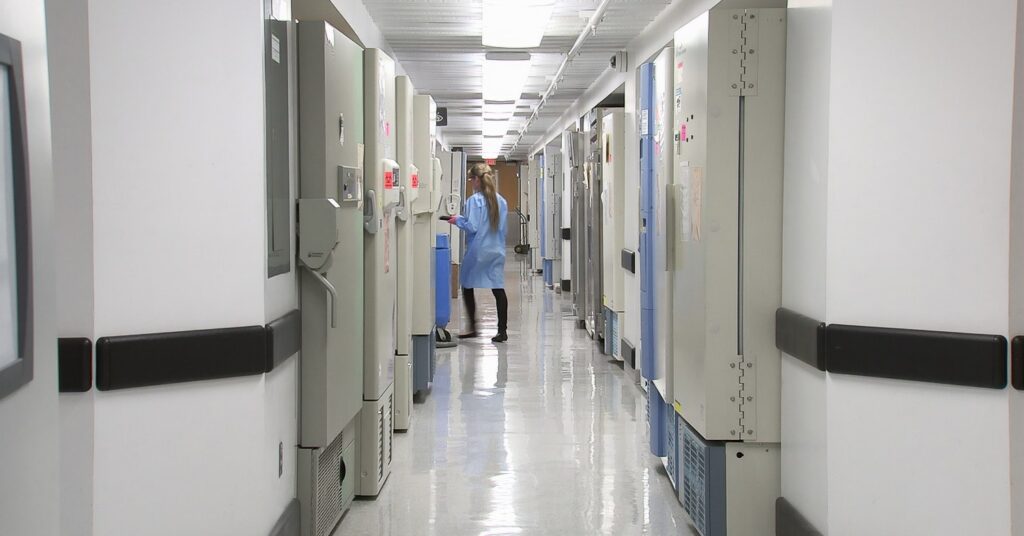
Where Do Epidemiologists Work?
Epidemiologists work in many settings, including hospitals, universities, and federal, [...]

Medical social workers (alternately known as healthcare social workers) provide case management services to patients in various stages of their healthcare journeys. These highly trained professionals use their knowledge of the healthcare and medical systems to help patients access medical resources, counseling, and social services. They also work within healthcare systems to advocate for policies that increase medical access for marginalized and vulnerable populations.
Medical social workers may specialize in areas including emergency, trauma (including child abuse and substance abuse), pediatrics, nephrology, and transplant and oncology, among others. They may also focus on medication management and adherence, end-of-life decisions, terminal illness, homelessness, and catastrophic disability.
If this career sounds like a good fit for you, you may be wondering how to become a medical social worker. This article answers that question and also addresses:
People choose to pursue a career as a medical social worker for many reasons. It’s an ideal profession for those looking for a job with meaning because medical social workers help the vulnerable, impoverished, or otherwise marginalized. This career path is an excellent choice for those who want to work directly with patients but do not want to practice medicine.
People become medical social workers because they:
According to the Bureau of Labor Statistics, healthcare social workers earn a median annual income of $62,310. Industries with the highest levels of healthcare social worker employment include general medical and surgical hospitals, individual and family services, home healthcare services, nursing care facilities, and outpatient care centers. National Association of Social Workers (NASW) research indicates that those with a Master of Social Work can earn approximately $13,000 more annually than those with a Bachelor of Social Work (BSW).
For medical social workers, no two days look the same. They are often pulled in many directions and assist a caseload of patients with varying needs. In a typical day, medical social workers may:
While the responsibilities of medical social workers vary widely, providing support to patients and their families is a constant. Medical social workers help patients acclimate to medical settings, understand their condition and treatment options, and navigate the healthcare system. They also assess and monitor the mental health of their patients.
| University and Program Name | Learn More |
|
Virginia Commonwealth University:
Online Master of Social Work
|
Becoming a successful medical social worker requires the right combination of education and experience to. The NASW’s Standards for Social Work Practice in Health Care Settings offers a thorough overview of the requirements and skills medical social workers need.
You can start preparing as early as high school. Take classes in biology, cultural studies, health, peer counseling, and technology. Working toward fluency in a foreign language will also help you qualify for jobs seeking bilingual candidates—it’s hard to go wrong with Spanish, spoken by one in eight Americans. Volunteering is also a great way to get a feel for a social work career. Volunteering at a medical facility will help you acclimate to the medical environment while teaching you medical terminology.
Early preparation is helpful but not necessary. However, steering your college education in the right direction is key.
Many professionals begin their careers by securing a bachelor’s degree in social work, a degree many entry-level positions require. Undergraduate courses will vary among schools but may include those in ethics, human behavior, cultural understanding, social welfare policy, and social work writing, among others. Undergraduate students can expect to complete around 45 credits of social work classes in addition to their general education and elective courses. Most programs also include a practicum or field experience component.
Many medical social workers earn master’s degrees in social work (MSW), with an emphasis on medicine, health, biology, or a related field. Students in graduate degree programs typically gain extensive experience in clinical settings. Course topics may include social problems and social welfare policy, human behavior and the social environment, policy analysis and change, and diversity and oppression in a social work context. Since medical social work is not typically a concentration, students interested in this field should complete their internships or practicums in clinical healthcare settings.
When researching master’s degree programs, be sure to narrow your search to those accredited by the Council on Social Work Education.
Internships and practicums comprise an important part of undergraduate and graduate degree programs in social work. According to the Mayo Clinic, medical social workers need to complete at least 900 hours in a medical social work internshipt.
Many employers seek candidates with at least one year of experience. However, some prefer applicants that bring five or more years of experience to the table. Field experience not only provides essential education but also helps build your resume. You may complete your field experience in a variety of settings, including hospitals, outpatient centers, rehabilitation facilities, doctors’ offices, nursing homes, and home health agencies.
Many employers require a valid social work license to be hired. Licensure requirements vary by state but typically include a minimum amount of supervised work experience. Those who do not pursue a clinical license may still qualify for positions in assisted living facilities, rehabilitation facilities, and nursing homes.
Although certification is not typically required, it may give you an advantage over other applicants when applying for jobs.
The NASW offers specialty, two-year certifications for social workers who fulfill certain requirements. The Certified Social Worker in Health Care (C-SWHC) is open to those who have earned a master’s degree, met the supervised experience requirements, and met the license credentialing criteria. You must also provide a reference from a professional colleague and pay relevant fees.
For credentials regarding working with older adults, the NASW offers three gerontology certifications representing different educational levels and levels of experience. There’s also a specialty certification for those working in hospice and palliative care.
Although a Master of Social Work is not required to become a medical social worker, many employed within the field choose to earn their master’s degree. Earning a master’s degree is a prerequisite for clinical licensure. If you hope to include one-on-one counseling among your services, you will need a Master of Social Work degree.
Online Master of Social Work programs offer a great option for working professionals and those looking for a flexible degree that can be completed at their own pace.
Tulane University has been a leader in social work education for over 100 years. The university’s School of Social Work offers several online Master of Social Work and Doctorate in Social Work programs. Tulane’s customizable 60-credit MSW program can be completed in 16 months as a full-time student or 32 months as a part-time student. Students are also required to complete 900 hours of field-based education.
The Virginia Commonwealth University School of Social Work, the top school of social work in Virginia, offers an online Master of Social Work program equally suited to aspiring field practitioners, advocates, and scholars. Students in this program learn how to create opportunities that challenge the status quo and break through systemic inequality; evaluate and implement programs and policies for measurable results in the communities they serve; and refine their professional skills to guide decision-making that improves lives through practice-informed research.
Medical social workers forge connections with their patients throughout their care; for those who can handle the inevitable stress of a medical environment, it can be a very rewarding career. Medical social workers play a critical role in helping patients with life-changing issues navigate emotional and administrative challenges within the healthcare system. If that sounds like something you’d enjoy and do well, then yes, this could be an excellent career for you.
Questions or feedback? Email editor@noodle.com

Epidemiologists work in many settings, including hospitals, universities, and federal, [...]

We explain the steps necessary to become a licensed mental [...]

Domestic violence call centers in the US field 20,000 calls [...]

An MBA with a Healthcare Management concentration can equip you [...]

Not everyone in a hospital wears scrubs. Some, like hospital [...]
Categorized as: Social Work, Social Work & Counseling & Psychology